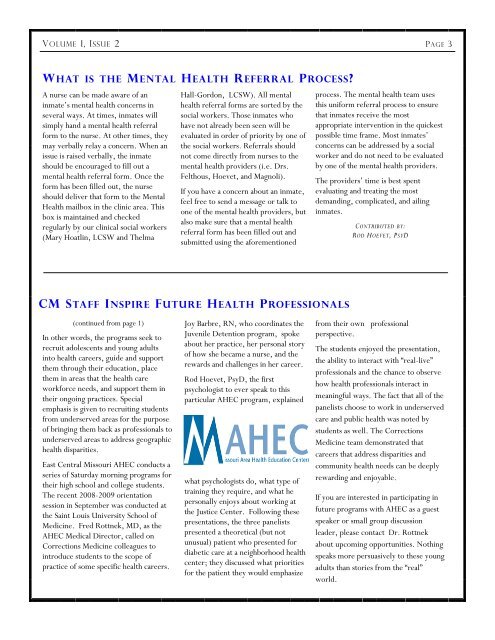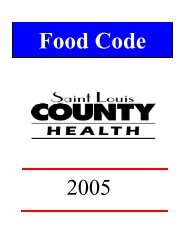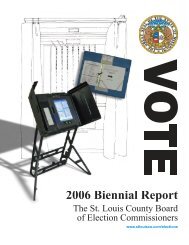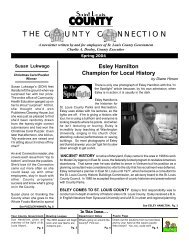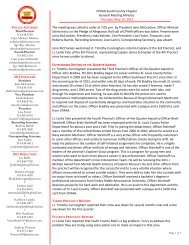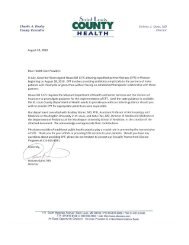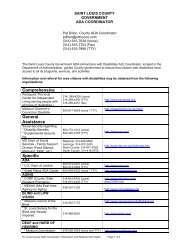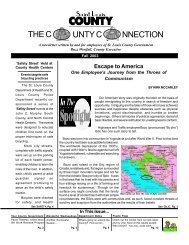CORRECTIONS MEDICINE - St. Louis County
CORRECTIONS MEDICINE - St. Louis County
CORRECTIONS MEDICINE - St. Louis County
Create successful ePaper yourself
Turn your PDF publications into a flip-book with our unique Google optimized e-Paper software.
VOLUME 1, ISSUE 2<br />
PAGE 3<br />
WHAT IS THE MENTAL HEALTH REFERRAL PROCESS?<br />
A nurse can be made aware of an<br />
inmate’s mental health concerns in<br />
several ways. At times, inmates will<br />
simply hand a mental health referral<br />
form to the nurse. At other times, they<br />
may verbally relay a concern. When an<br />
issue is raised verbally, the inmate<br />
should be encouraged to fill out a<br />
mental health referral form. Once the<br />
form has been filled out, the nurse<br />
should deliver that form to the Mental<br />
Health mailbox in the clinic area. This<br />
box is maintained and checked<br />
regularly by our clinical social workers<br />
(Mary Hoatlin, LCSW and Thelma<br />
Hall-Gordon, LCSW). All mental<br />
health referral forms are sorted by the<br />
social workers. Those inmates who<br />
have not already been seen will be<br />
evaluated in order of priority by one of<br />
the social workers. Referrals should<br />
not come directly from nurses to the<br />
mental health providers (i.e. Drs.<br />
Felthous, Hoevet, and Magnoli).<br />
If you have a concern about an inmate,<br />
feel free to send a message or talk to<br />
one of the mental health providers, but<br />
also make sure that a mental health<br />
referral form has been filled out and<br />
submitted using the aforementioned<br />
process. The mental health team uses<br />
this uniform referral process to ensure<br />
that inmates receive the most<br />
appropriate intervention in the quickest<br />
possible time frame. Most inmates’<br />
concerns can be addressed by a social<br />
worker and do not need to be evaluated<br />
by one of the mental health providers.<br />
The providers’ time is best spent<br />
evaluating and treating the most<br />
demanding, complicated, and ailing<br />
inmates.<br />
CONTRIBUTED BY:<br />
ROD HOEVET, PSYD<br />
CM STAFF INSPIRE FUTURE HEALTH PROFESSIONALS<br />
(continued from page 1)<br />
In other words, the programs seek to<br />
recruit adolescents and young adults<br />
into health careers, guide and support<br />
them through their education, place<br />
them in areas that the health care<br />
workforce needs, and support them in<br />
their ongoing practices. Special<br />
emphasis is given to recruiting students<br />
from underserved areas for the purpose<br />
of bringing them back as professionals to<br />
underserved areas to address geographic<br />
health disparities.<br />
East Central Missouri AHEC conducts a<br />
series of Saturday morning programs for<br />
their high school and college students.<br />
The recent 2008-2009 orientation<br />
session in September was conducted at<br />
the Saint <strong>Louis</strong> University School of<br />
Medicine. Fred Rottnek, MD, as the<br />
AHEC Medical Director, called on<br />
Corrections Medicine colleagues to<br />
introduce students to the scope of<br />
practice of some specific health careers.<br />
Joy Barbre, RN, who coordinates the<br />
Juvenile Detention program, spoke<br />
about her practice, her personal story<br />
of how she became a nurse, and the<br />
rewards and challenges in her career.<br />
Rod Hoevet, PsyD, the first<br />
psychologist to ever speak to this<br />
particular AHEC program, explained<br />
what psychologists do, what type of<br />
training they require, and what he<br />
personally enjoys about working at<br />
the Justice Center. Following these<br />
presentations, the three panelists<br />
presented a theoretical (but not<br />
unusual) patient who presented for<br />
diabetic care at a neighborhood health<br />
center; they discussed what priorities<br />
for the patient they would emphasize<br />
from their own professional<br />
perspective.<br />
The students enjoyed the presentation,<br />
the ability to interact with “real-live”<br />
professionals and the chance to observe<br />
how health professionals interact in<br />
meaningful ways. The fact that all of the<br />
panelists choose to work in underserved<br />
care and public health was noted by<br />
students as well. The Corrections<br />
Medicine team demonstrated that<br />
careers that address disparities and<br />
community health needs can be deeply<br />
rewarding and enjoyable.<br />
If you are interested in participating in<br />
future programs with AHEC as a guest<br />
speaker or small group discussion<br />
leader, please contact Dr. Rottnek<br />
about upcoming opportunities. Nothing<br />
speaks more persuasively to these young<br />
adults than stories from the “real”<br />
world.


